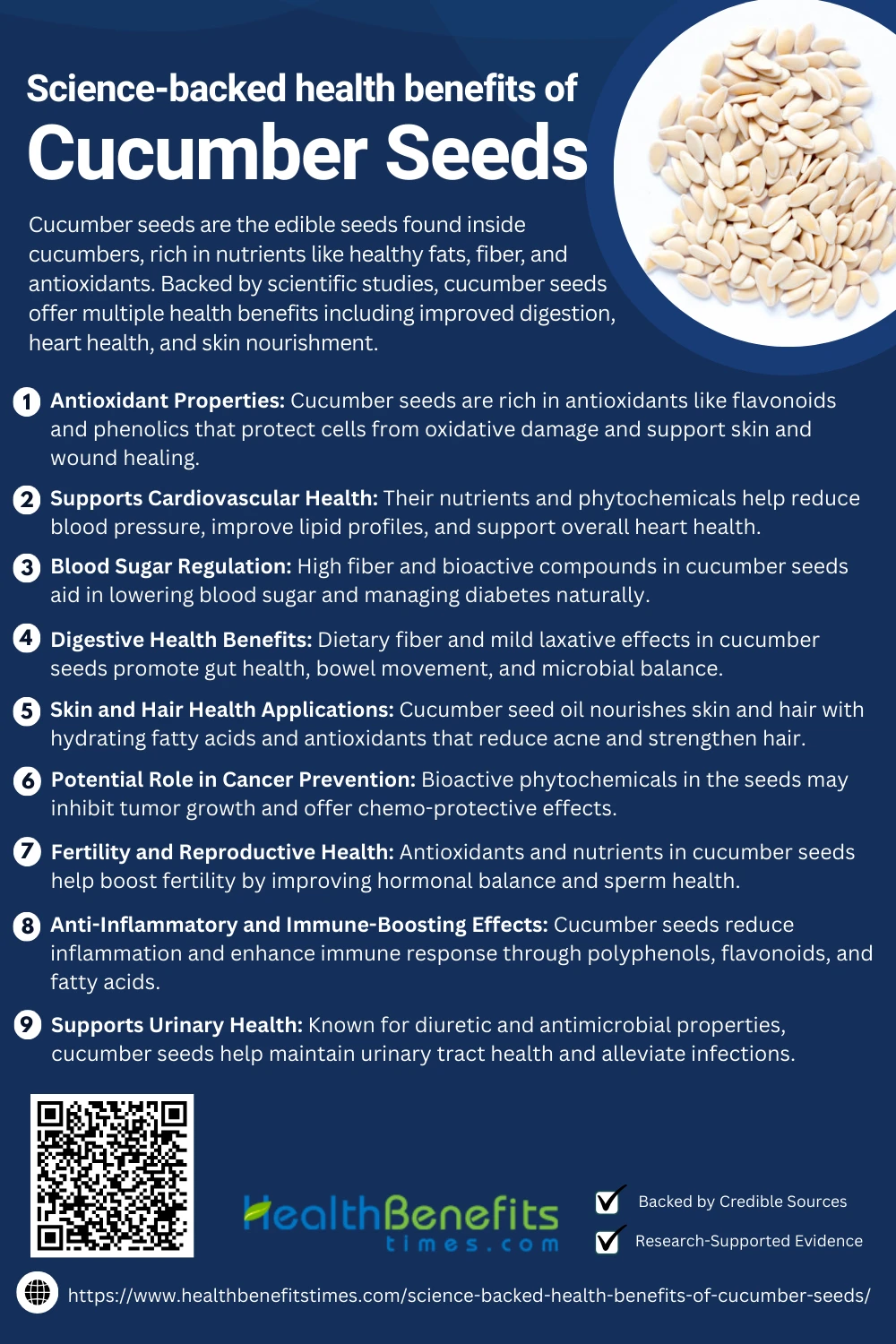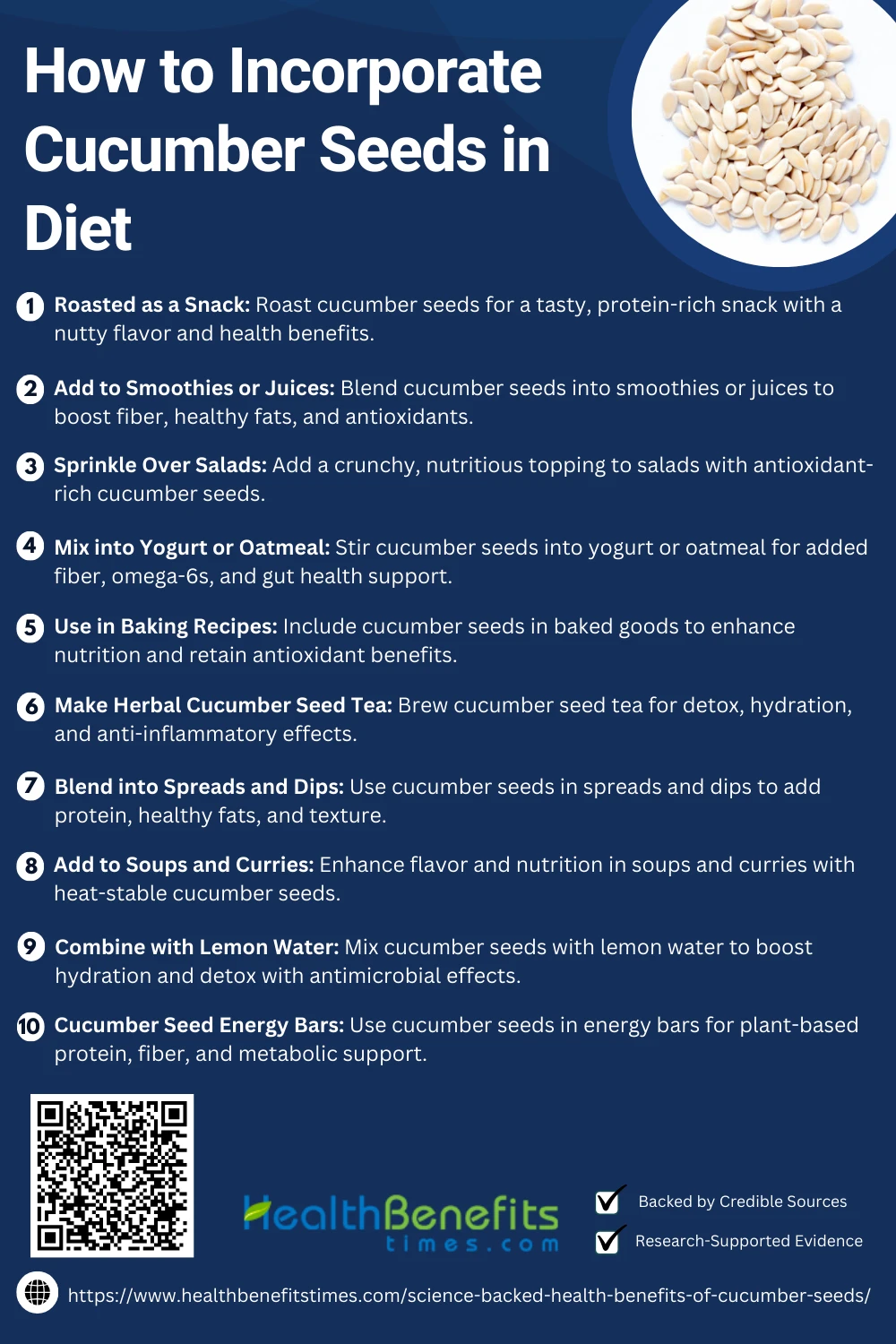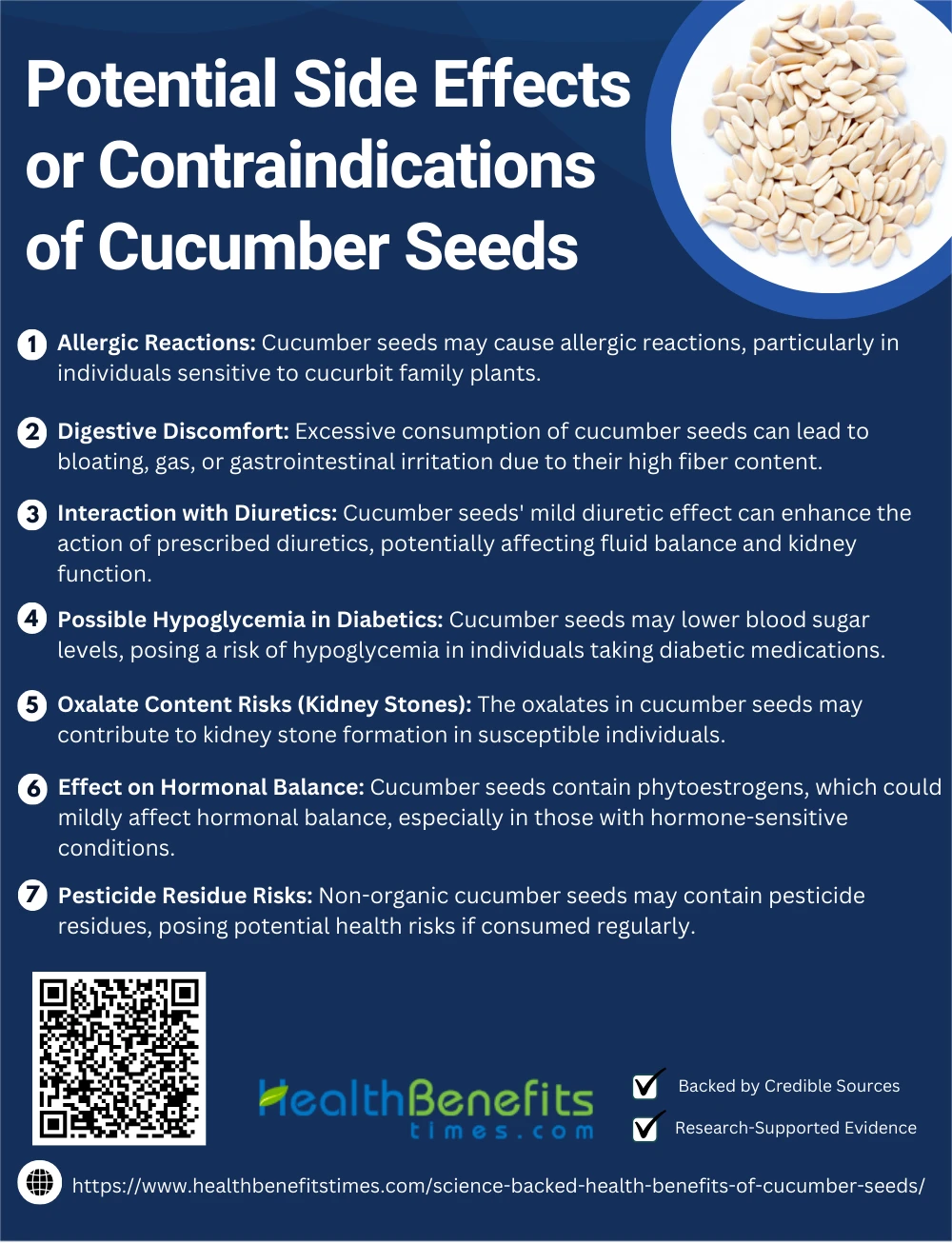- Cucumber seeds are the edible seeds found inside cucumbers, rich in nutrients like healthy fats, fiber, and antioxidants.
- Backed by scientific studies, cucumber seeds offer multiple health benefits including improved digestion, heart health, and skin nourishment.
- Incorporating these nutrient-dense seeds into your diet can naturally boost immunity, support detoxification, and promote overall wellness.
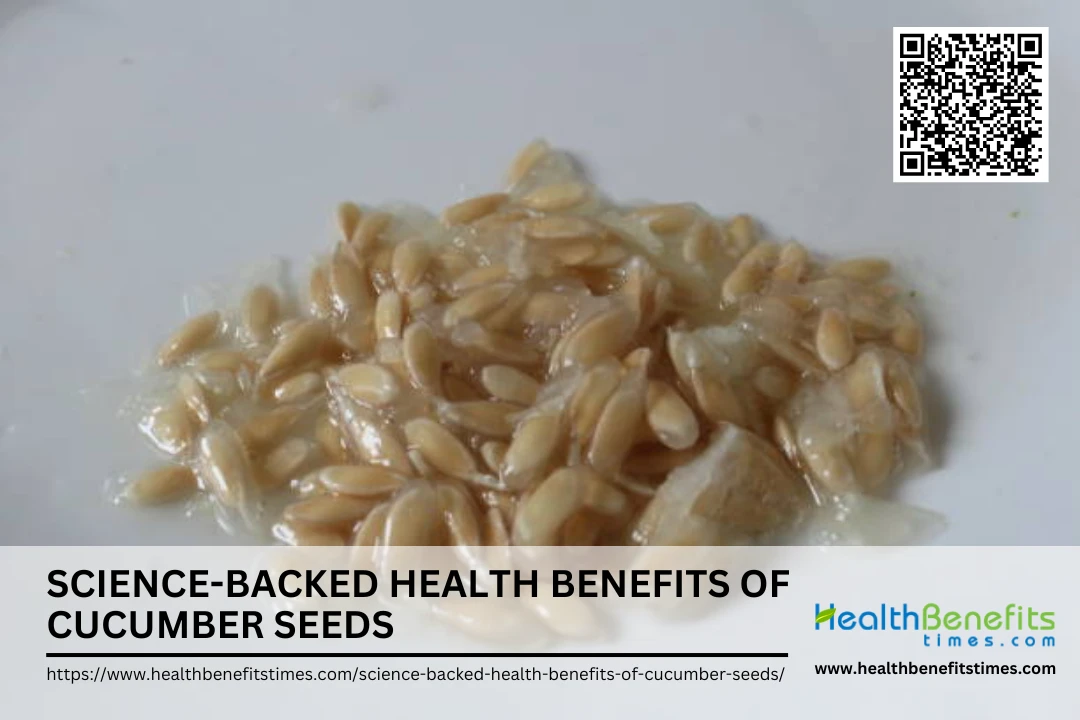 Cucumber seeds are the edible inner part of the cucumber fruit, rich in essential nutrients such as healthy fats, fiber, and micronutrients, particularly magnesium and potassium, with documented antioxidant and therapeutic potentials. Cucumber seeds, long overlooked in favor of the crisp flesh of the fruit, are now garnering scientific attention for their diverse health benefits. These seeds are nutrient-dense, containing a unique combination of bioactive compounds such as polyunsaturated fats, flavonoids, and trace minerals that contribute to cardiovascular, digestive, and metabolic wellness. Recent research confirms their hypocholesterolemic and anti-inflammatory effects, positioning them as a promising addition to plant-based dietary strategies. Moreover, their high concentration of crude proteins and essential minerals suggests applications beyond human nutrition, including cosmetic and therapeutic uses.
Cucumber seeds are the edible inner part of the cucumber fruit, rich in essential nutrients such as healthy fats, fiber, and micronutrients, particularly magnesium and potassium, with documented antioxidant and therapeutic potentials. Cucumber seeds, long overlooked in favor of the crisp flesh of the fruit, are now garnering scientific attention for their diverse health benefits. These seeds are nutrient-dense, containing a unique combination of bioactive compounds such as polyunsaturated fats, flavonoids, and trace minerals that contribute to cardiovascular, digestive, and metabolic wellness. Recent research confirms their hypocholesterolemic and anti-inflammatory effects, positioning them as a promising addition to plant-based dietary strategies. Moreover, their high concentration of crude proteins and essential minerals suggests applications beyond human nutrition, including cosmetic and therapeutic uses.
Nutritional Composition of Cucumber Seeds
Cucumber seeds are a hidden nutritional gem, packed with essential nutrients like healthy fats, protein, fiber, vitamins, and minerals that contribute to overall health, making them worth including in your diet.
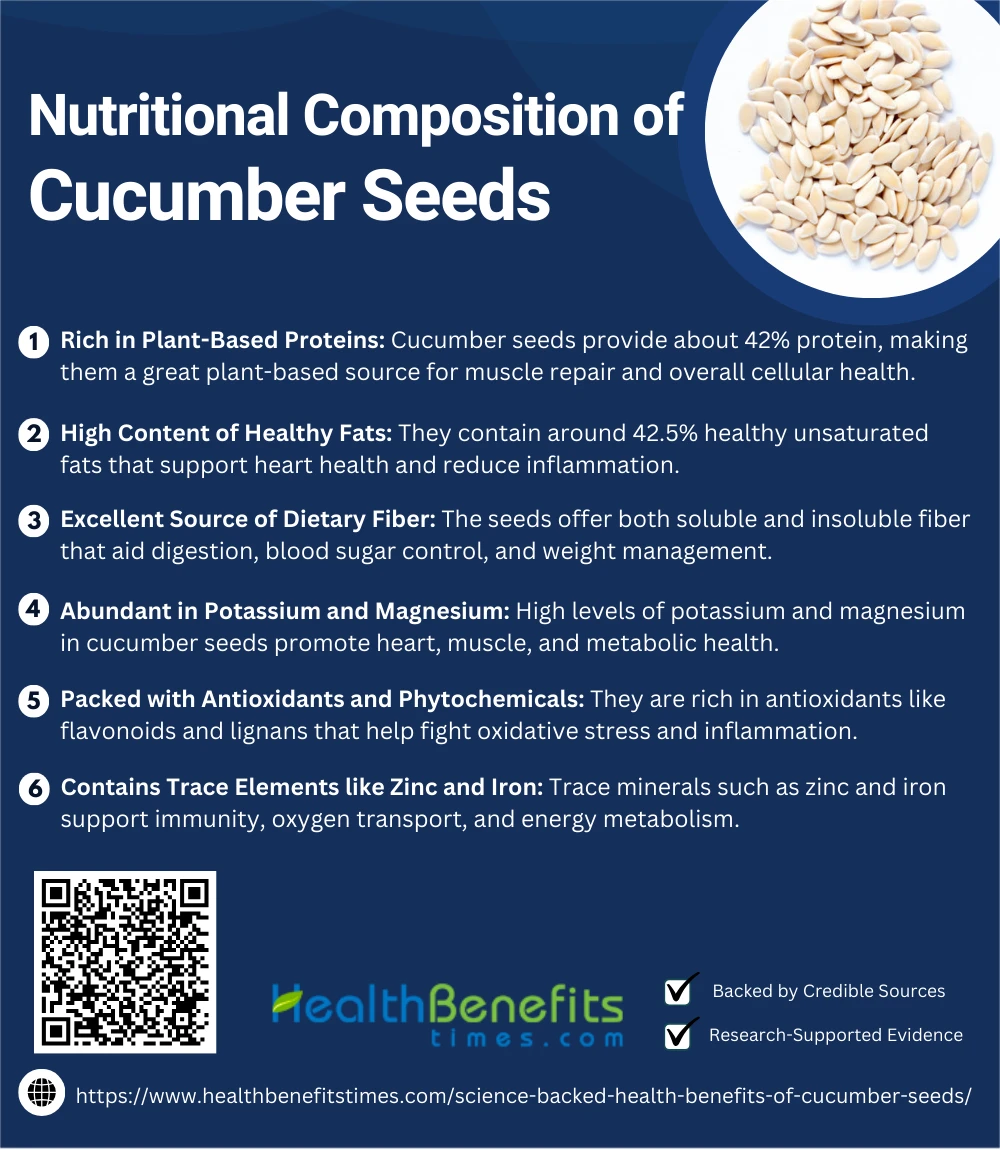 1. Rich in Plant-Based Proteins
1. Rich in Plant-Based Proteins
Cucumber seeds are an excellent source of plant-based proteins, containing approximately 42% crude protein by weight. These proteins are particularly rich in essential amino acids, contributing to muscle repair, enzyme synthesis, and cellular health. Their protein profile positions them as a sustainable alternative to animal-derived proteins, especially in vegan or vegetarian diets.
2. High Content of Healthy Fats
Approximately 42.5% of cucumber seed composition consists of fats, mainly unsaturated fatty acids such as linoleic and oleic acids. These fats are crucial for cardiovascular health, aiding in cholesterol regulation and reducing inflammation. The lipid profile makes cucumber seed oil a potential candidate for nutraceutical and cosmeceutical uses.
3. Excellent Source of Dietary Fiber
Cucumber seeds contain both soluble and insoluble fiber, which promote gut health by enhancing bowel movements and feeding beneficial gut bacteria. This fiber helps regulate blood sugar levels and supports weight management by promoting satiety.
4. Abundant in Potassium and Magnesium
Mineral-wise, cucumber seeds are especially high in potassium and magnesium. Potassium helps regulate blood pressure and fluid balance, while magnesium supports muscle function, nerve transmission, and bone health. These minerals contribute significantly to cardiovascular and metabolic well-being.
5. Packed with Antioxidants and Phytochemicals
Cucumber seeds are a source of antioxidant compounds such as flavonoids and lignans, which help combat oxidative stress and reduce the risk of chronic diseases. These phytochemicals are especially valued for their anti-inflammatory, anti-aging, and potential anticancer properties.
6. Contains Trace Elements like Zinc and Iron
In addition to the major minerals, cucumber seeds contain zinc and iron in trace amounts. Zinc plays a critical role in immune function, wound healing, and DNA synthesis, while iron is essential for oxygen transport and energy metabolism.
Comparative profile of cucumber seeds with other seeds (e.g., pumpkin, flax)
Here’s a comparative table highlighting key differences and similarities between cucumber seeds, pumpkin seeds, and flax seeds in terms of nutritional value, size, usage, oil content, and more:
| Feature | Cucumber Seeds | Pumpkin Seeds | Flax Seeds |
| Botanical Name | Cucumis sativus | Cucurbita pepo | Linum usitatissimum |
| Seed Size | Small, thin, oval | Medium-large, flat, oval | Tiny, flat, oval |
| Color | Pale white to beige | Green (shelled), white (unshelled) | Brown or golden |
| Texture | Soft when fresh, harder when dry | Hard shell (if unhulled), crunchy inside | Smooth, slightly glossy |
| Oil Content | Moderate (~25–30%) | High (~45–50%) | Very high (~40–50%) |
| Protein Content | Moderate (~15–20%) | High (~30–35%) | Moderate (~18–20%) |
| Fiber Content | Low to moderate | Moderate (~5–10g per 100g) | Very high (~27g per 100g) |
| Omega-3 Fatty Acids | Low | Low | Very high (ALA) |
| Notable Nutrients | Magnesium, potassium | Zinc, magnesium, antioxidants | Lignans, omega-3, B vitamins |
| Health Benefits | Digestive aid, mild anti-inflammatory | Heart health, prostate support | Heart health, hormone balance, digestive health |
| Culinary Use | Often removed, roasted as snack | Roasted, snacking, baking | Smoothies, baking, oil, meal |
| Oil Use | Used in cosmetics, massage oils | Used in cooking, skincare | Used in supplements, skin and hair care |
| Shelf Life | Moderate when dried and stored well | Long (if kept dry and cool) | Needs refrigeration to prevent rancidity |
| Allergen Risk | Low | Moderate (for some individuals) | Rare, but possible |
Science-Backed Health Benefits of Cucumber Seeds
Cucumber seeds offer impressive health benefits supported by scientific research. Rich in nutrients and bioactive compounds, they promote heart, digestive, and skin health, while supporting immunity and reducing inflammation naturally.
Cucumber seeds exhibit powerful antioxidant properties, primarily due to their rich phytochemical content including flavonoids and phenolic compounds. These antioxidants help neutralize free radicals and reduce oxidative stress, contributing to better skin health and cellular protection as demonstrated by Soares et al. (2023). Studies further show that cucumber seed oil possesses antimicrobial and wound-healing effects, highlighting its multifunctionality. (1) Additionally, research by Borecka & Karaś (2025) affirms its nutritional density. Experimental findings from Lerma-Moliz et al. (2024) and Soleimani et al. (2024) also highlight cucumber seed extract’s antioxidant response in agricultural and biomedical applications. (2) (3) (4)
2. Supports Cardiovascular Health
Cucumber seeds have shown potential in promoting cardiovascular wellness through their antioxidant-rich composition and magnesium content, which aids in blood pressure regulation. Clinical data confirm their role in reducing hyperlipidemia and vascular inflammation as observed by Soltani et al. (2017). (5) Phytochemicals in the seeds improve endothelial function and modulate lipid profiles. (6) ({% trusted %}) Other works by Fatima et al. (2024) and Borecka & Karaś (2025) further support their cardioprotective benefits. (1) (4)
3. Blood Sugar Regulation
Cucumber seeds help manage blood glucose levels due to their high fiber, low glycemic properties, and bioactive flavonoids. A study by Fatima et al. (2024) highlighted the hypoglycemic action of ethanolic extracts in experimental models. (1) Additionally, Mallick (2022) noted lignans in cucumber aid glucose metabolism. (7) Ihim et al. (2017), Ezeugwunne et al. (2017), and Chakraborty & Rayalu (2021) also support cucumber seed’s role in diabetic care. (8) (9) (8)
4. Digestive Health Benefits
Cucumber seeds are rich in dietary fiber and mild laxatives, supporting gut motility and nutrient absorption. They promote healthy bowel movements while soothing the gastrointestinal lining. Research by Cheikhyoussef et al. (2025) confirms their high protein and fiber content. (10) Studies also note antimicrobial activity that helps balance gut flora, and further support is found in Rolnik & Olas (2022), Chakraborty & Rayalu (2021), and Nguyen et al. (2019). (11) (12) (13) (1)
5. Skin and Hair Health Applications
Cucumber seed oil is rich in linoleic acid, antioxidants, and vitamins A and E, which deeply hydrate and rejuvenate skin and hair. It helps treat acne, soothe inflamed skin, and boost hair strength. Clinical analysis by Ahmad et al. (2020) affirms these uses. (14) Additional support is found in Sultana et al. (2020), Naureen et al. (2022), Chakraborty & Rayalu (2021), and Khan et al. (2022). (15) (16) (17) (11)
6. Potential Role in Cancer Prevention
Cucumber seeds contain a range of bioactive phytochemicals, such as saponins and flavonoids, which may play a role in inhibiting carcinogenic activity and supporting cellular health. A study by Oragwu et al. (2021) revealed their antioxidant and saponin richness, linked to anti-tumor potential. (18) Fatima et al. (2024) highlighted anti-inflammatory responses, while Mallick (2022) and Ahmad et al. (2020) noted their chemo-protective effects. (7) (1) (14) Further, Bakam et al. (2023) demonstrated anti-prostate cancer activity in vivo. (19)
7. Fertility and Reproductive Health
Cucumber seeds are increasingly recognized for enhancing fertility and reproductive health due to their high antioxidant and micronutrient content. Obembe et al. (2023) demonstrated improved sex hormone profiles and sperm health in rats. (20) Similarly, Wannang et al. (2008) found reproductive parameter improvements. (21) Research by Agbor et al. (2022) and Ojha et al. (2015) confirm germination and nutrient support. (22) (23) Further, Gonçalves et al. (2023) explored cucumber-based biofertility interactions. (24)
8. Anti-Inflammatory and Immune-Boosting Effects
Cucumber seeds possess remarkable anti-inflammatory and immune-modulating properties due to their rich content of polyphenols, flavonoids, and essential fatty acids. Studies highlight their ability to inhibit pro-inflammatory cytokines like IL-6 and TNF-α. (25) Moreover, they modulate oxidative stress, enhancing cellular immunity. (15) Animal trials affirm their efficacy in reducing inflammation-related edema. (26) Additionally, cucumber seed extracts have shown immunostimulatory action and potential prebiotic benefits through gut microbiota modulation. (27) (28)
9. Supports Urinary Health
Cucumber seeds are traditionally acclaimed for supporting urinary tract health, notably by promoting diuresis and preventing infections. Their bioactive components demonstrate antimicrobial activity against uropathogens. (29) Research confirms their role in alleviating urinary disorders by improving renal filtration and urine output. (26) Spasmolytic effects on the bladder were also observed in vitro. (28) Ethnomedicinal data reinforce their use in managing bladder discomfort and infections. (15) Nutritional reviews further emphasize their potential in urinary tract detoxification. (30)
How to Incorporate Cucumber Seeds in Diet
Incorporating cucumber seeds into your diet is simple and nutritious. You can enjoy them raw, roasted, blended in smoothies, or added to salads, trail mixes, and baked goods for extra health benefits.
Cucumber seeds can be roasted and enjoyed as a healthy, protein-rich snack, much like pumpkin and melon seeds. Their nutty flavor and nutrient density make them ideal for functional food applications. Studies confirm their palatability, safety, and nutritional benefits post-roasting. (31) (32) (33)
2. Add to Smoothies or Juices
Cucumber seeds enhance smoothies and juices with valuable nutrients such as fiber, minerals, and polyunsaturated fatty acids. Their inclusion supports hydration and antioxidant intake, benefiting cardiovascular and metabolic health. A ScienceDirect study highlights cucumber seeds’ rich content in linoleic and oleic acids. Additionally, research from NCBI indicates their antimicrobial and anti-inflammatory properties. (34) A recent Springer article further confirms their role in functional beverages due to bioactive compounds.
3. Sprinkle Over Salads
Sprinkling cucumber seeds on salads not only adds a nutty crunch but also boosts dietary intake of antioxidants and unsaturated fats. According to Springer research, these seeds are high in phenolics and flavonoids. A ScienceDirect review reports their impressive nutritional profile. An NCBI study supports their role in reducing oxidative stress, making them a smart salad topping. (34)
4. Mix into Yogurt or Oatmeal
Mixing cucumber seeds into yogurt or oatmeal delivers fiber, omega-6 fatty acids, and antioxidants. A ScienceDirect study highlights their nutritional oil profile. Springer research confirms bioactive benefits, while NCBI data shows positive effects on gut health and immune function. (34)
5. Use in Baking Recipes
Cucumber seeds enhance baking recipes with nutrients like unsaturated fats, polyphenols, and dietary fiber. ScienceDirect findings discuss their stable oil in heat. According to Springer, their antioxidant content remains viable when baked. NCBI studies support their use in functional baked goods. (34)
6. Make Herbal Cucumber Seed Tea
Cucumber seed tea offers anti-inflammatory and antioxidant benefits, supporting detoxification and hydration. A ScienceDirect study highlights its phenolic richness. Springer research validates its use in traditional remedies. Meanwhile, NCBI data confirms antimicrobial and immune-boosting properties in seed infusions. (34)
7. Blend into Spreads and Dips
Blending cucumber seeds into dips or spreads improves texture and adds plant-based protein and essential fatty acids. ScienceDirect findings emphasize its high linoleic acid content. NCBI supports its prebiotic potential, while Springer research confirms its antioxidant profile remains stable in emulsions. (34) (34)
8. Add to Soups and Curries
Incorporating cucumber seeds into soups or curries enhances flavor while delivering essential nutrients like omega-6 fatty acids and antioxidants. ScienceDirect research confirms their stability under heat. Springer studies support their use in savory dishes. NCBI data highlight anti-inflammatory effects during digestion. (34)
9. Combine with Lemon Water
Combining cucumber seeds with lemon water boosts detoxification and supports hydration. Springer research shows antioxidant synergy. ScienceDirect studies detail their high polyunsaturated fat content. NCBI findings reveal antimicrobial properties, enhancing the cleansing benefits of lemon-cucumber infusions. (34)
10. Cucumber Seed Energy Bars
Cucumber seeds are ideal for energy bars, offering plant-based protein, fiber, and healthy fats. ScienceDirect research highlights their rich linoleic acid profile. Springer findings support their role in functional foods. NCBI evidence confirms their antioxidant and anti-inflammatory properties enhance energy metabolism. (34)
Potential side effects or contraindications of Cucumber Seeds
While cucumber seeds are generally safe, excessive consumption may cause digestive discomfort in some individuals. Those with seed allergies or specific medical conditions should consult a healthcare professional before adding them regularly.
Cucumber seeds can trigger allergic responses in sensitive individuals, especially those allergic to cucurbit family plants. A NCBI report highlights hypersensitivity symptoms like skin irritation. (34) ScienceDirect discusses cross-reactivity, while Springer research emphasizes potential allergenicity of cucumber-derived proteins.
2. Digestive Discomfort
High fiber content in cucumber seeds can lead to bloating, gas, or mild gastrointestinal irritation. ScienceDirect research notes overconsumption risks. NCBI findings confirm roughage-related discomfort in sensitive guts. (34) Additionally, Springer studies suggest moderation when consuming seeds in raw or concentrated form.
3. Interaction with Diuretics
Cucumber seeds have mild diuretic properties, potentially enhancing the effect of prescribed diuretics. ScienceDirect data suggests fluid balance influence. NCBI research warns of electrolyte shifts, and Springer findings emphasize monitoring kidney function when combining with water-loss medications. (34)
4. Possible Hypoglycemia in Diabetics
Cucumber seeds may modestly lower blood sugar levels, raising concerns for those on diabetic medications. NCBI evidence notes hypoglycemic effects. (34) ScienceDirect outlines glucose-modulating compounds. Springer research advises caution and professional consultation for diabetic patients consuming cucumber seed supplements.
5. Oxalate Content Risks (Kidney Stones)
Cucumber seeds contain trace oxalates, which can contribute to kidney stone formation in susceptible individuals. ScienceDirect studies confirm their presence. NCBI data emphasizes oxalate intake moderation. (34) Springer research advises those with renal conditions to consult a healthcare provider before regular consumption.
6. Effect on Hormonal Balance
Cucumber seeds may contain phytoestrogens, plant compounds that can mildly influence hormonal activity. Springer findings indicate potential endocrine interaction. ScienceDirect data discusses estrogen-like activity, while NCBI research advises caution for individuals with hormone-sensitive conditions like breast or ovarian cancers. (34)
7. Pesticide Residue Risks
Cucumber seeds, especially from non-organic sources, may retain pesticide residues that pose health risks over time. ScienceDirect research highlights chemical accumulation in seed coats. NCBI data connects chronic exposure to toxicity. (34) Springer findings recommend organic sourcing for dietary safety.
Conclusion
Cucumber seeds, often overlooked, are a powerhouse of nutrition and health-promoting compounds. Backed by scientific research, they offer numerous benefits—from supporting heart and digestive health to enhancing skin, immunity, and detoxification. Rich in essential nutrients like healthy fats, fiber, vitamins, and antioxidants, these tiny seeds contribute significantly to overall well-being. Incorporating them into your daily diet is simple and effective, whether through smoothies, snacks, or natural supplements. However, moderation is key, and those with allergies or specific conditions should seek medical advice. Embracing cucumber seeds is a small yet impactful step toward a healthier, more balanced lifestyle.


